Ben Carson loses two top aides as his campaign flounders
- Share via
By the numbers
Welcome to Trail Guide, your host through the wilds of the 2016 presidential campaign. Here's what we're talking about as a new year begins:
- Ben Carson's campaign took another hit as his campaign manager and another top aide resigned
- Jeb Bush was trying to be lighthearted but dredged up the costliest disaster in U.S. history
- Marco Rubio's unsusual campaign style has strategists wondering whether he'll succeed
- Ted Cruz raised almost $20 million for the quarter, building on momentum that has him leading in Iowa
- Bush's campaign let its own shakeup be known
- Happy New Year! The election year itself is nearly upon us, and the Iowa caucuses are a month away
Clinton praises new California, Oregon voter registration laws
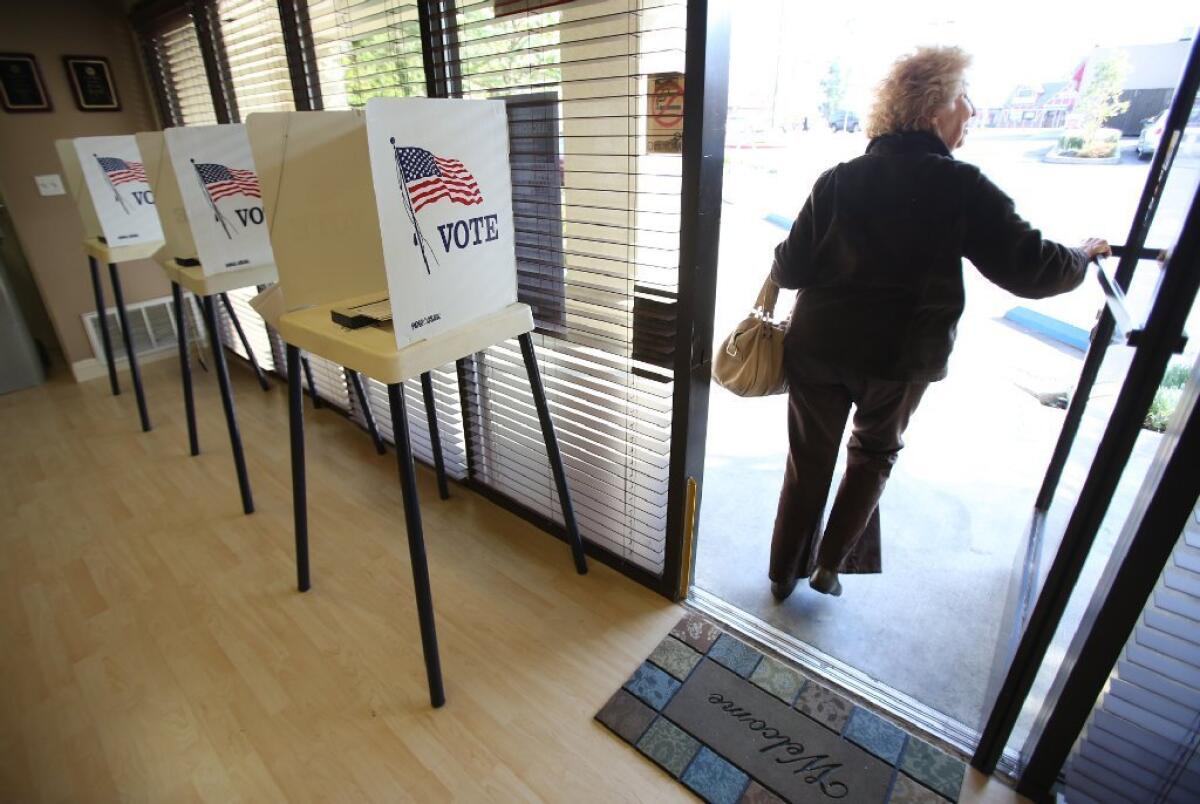
As California and Oregon launch new laws to expand voter registration, Hillary Clinton sees a model for the rest of the country.
"California and Oregon have the right idea," the Democratic presidential candidate said in a statement. "I hope more states follow their lead."
Officials are still working on a new voter database in California, and the registration law isn't expected to be implemented until after the June primary. The Times' Melanie Mason explained how the process will work after Gov. Jerry Brown signed the measure in October.
Clinton has called for automatic voter registration when citizens turn 18, a position also supported by her chief rival in the Democratic primary, Sen. Bernie Sanders of Vermont. Former Maryland Gov. Martin O'Malley, another Democratic candidate, wants a constitutional amendment to protect voting rights.
"The right to vote is the cornerstone of our democracy, and America is stronger when more of us vote," Clinton said. "That's why I and many others have been alarmed to see several states make it harder — not easier — for people to vote."
Turning the screws on the press
When it comes to pushing Hillary Clinton's agenda in Washington, there are few people as aggressive as Philippe Reines, one of her longtime advisors. That includes managing press coverage, and newly released emails provide another look at how Reines deals with reporters.
In one email, Reines said he helped make an Associated Press story about a State Department program "99% better." Another Clinton advisor, Jake Sullivan, responded by saying "color me impressed."
Reines also leaped into action when a Washington Post columnist irked Clinton for underreporting the number of times she visited the White House. Once he corrected the number, Reines wrote, "it's my mission today to ram this down his throat." The Post ran a follow-up story later that day.
Reines also pressured New York Times reporters to back off a story he thought would be unfavorable to the State Department. "I'm afraid we haven't been able to knock them off their thesis," he wrote.
While chief diplomat, Clinton kept tabs on healthcare debate
Barack Obama and Hillary Clinton during the 2008 presidential campaign. (Michal Czerwonka / EPA)
Hillary Clinton’s day job in the Obama administration was international diplomacy, but she didn’t take her eye off the president’s chief domestic priority during his first term.
Newly released emails from Clinton’s tenure as secretary of State show that she kept tabs on the battle over the Affordable Care Act, even chipping in to help rally votes on Capitol Hill to ensure its passage. The emails from Clinton’s personal account, which she used to conduct government business, were part of the latest batch to be made public under court order on Thursday.
Healthcare is an area of particular interest to Clinton – she tried unsuccessfully to expand coverage when she was first lady in the '90s.
In September 2009, she emailed Neera Tanden, a longtime colleague who was working in the Obama administration, to check on the issue.
"What is happening on that front? Is there a new strategy?" Clinton wrote. Then she added, "Let me know if I can help?"
Tanden, who worked on Clinton’s failed 2008 presidential campaign before joining Obama’s team, responded wistfully.
“There isn’t a day that goes by that I don’t think how different things would be on this issue if life had worked out differently,” she wrote. “I know you have admonished me to look forward, but on this issue of all issues, it is hard.”
Later in the month, Clinton and Tanden traded wonky emails about health policy – “why don’t they go w non-profit insurance companies instead of cooperatives,” the secretary wrote in critiquing legislative strategy.
As a final vote neared on the landmark healthcare proposal, a member of Clinton’s staff sent her talking points for calling members of Congress. First on the docket was Loretta Sanchez (D-Santa Ana) and a list of potential benefits to her Southern California district.
After Congress passed the bill and Obama signed it into law, Tanden looked for ways to make sure Clinton got some credit.
In a May 2010 email, she wrote that she was meeting with a New York Times reporter “to pitch him on how so many of your ideas are in the healthcare bill.” Tanden added, “Let me know if there’s anything else for this story that would be helpful.”
Clinton responded, “I will call you later.”
Tanden's loyalty to Clinton is evident in her emails. In January 2012, she sent her a note apologizing for a quote criticizing Obama's campaign for personal attacks on Clinton in 2008.
"My apologies if this is a problem," Tanden wrote.
Clinton didn't seem to mind.
"Well, the truth can hurt, can't it?" she wrote.
More Clinton emails released
Political reporters are ringing in the new year by sifting through another batch of Hillary Clinton's emails.
The State Department released about 5,500 pages on Thursday.
Officials have been reviewing and releasing Clinton's messages since it was revealed that the Democratic presidential candidate used a private account while she was secretary of State. More emails are expected next week.
The hardest worker on the campaign trail? It could be Obama
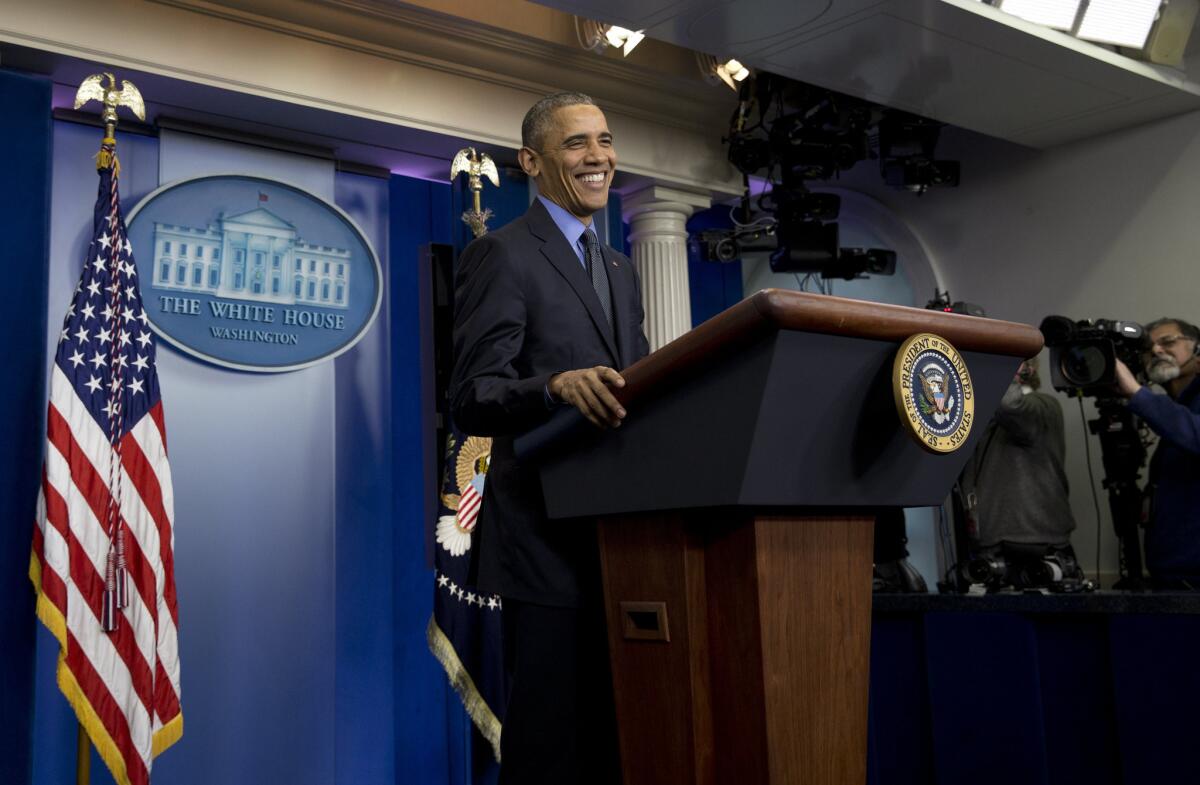
President Obama has made clear to aides that once he returns from his end-of-the-year vacation, he’ll spend 2016 helping campaign for the Democratic nominee to succeed him, in part to preserve his own legacy.
You might think the candidates have the most invested in the 2016 presidential election, but someone else has nearly as much riding on the outcome: President Obama.
Though he will not appear on the ballot, Obama believes his legacy hangs in the balance in the 2016 election. He has implemented policy on climate change, detente with Cuba and other issues through sweeping use of his executive power, all of which could be stripped away by any future Oval Office occupant.
Thus, his legacy likely flourishes under a Democratic successor or disassembles under a Republican.
Carson campaign manager quits
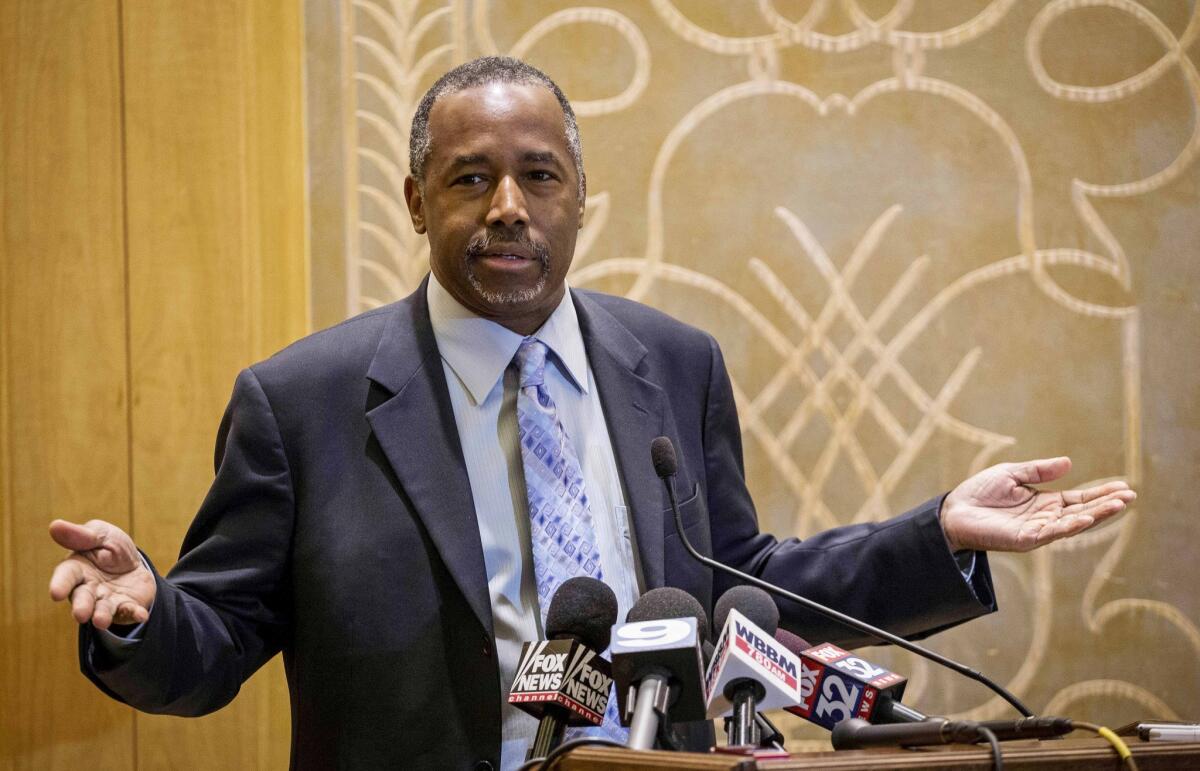
Republican presidential candidate Ben Carson takes questions from reporters Thursday at the Peninsula Hotel in Chicago.
The already struggling Ben Carson presidential campaign took another blow Thursday as two top aides resigned, just a little more than four weeks before the Iowa caucuses kick off the election season.
In October, Carson led the polls in Iowa, bolstered by strong backing from evangelical Christians. But his support eroded quickly as he came under scrutiny , even before a renewed focus on terrorism highlighted his lack of experience.
Carson has continued to raise huge sums -- his campaign announced Wednesday that it had raked in $23 million in the final three months of the year. Much of the money has been immediately recycled into his fundraising, a lucrative operation for the campaign operatives who run it.
In the meantime, however, Carson has struggled to regain his standing in the campaign.
Earlier this month, in interviews, Carson indicated that he planned a shakeup of his staff, only to say later that he had full confidence in his aides.
The shakeup came Thursday, announced in a statement to the Des Moines Register and other outlets from Carson's communications director, Doug Watts. He and campaign manager, Barry Bennett, had "resigned from the Carson campaign effective immediately," the statement said.
'Hurricane Katrina' name turns humorous for Jeb Bush
Hurricane Katrina haunted the Bush family anew Wednesday. Jeb Bush referenced perhaps the most devastating domestic catastrophe of his brother George W. Bush’s presidency when he nicknamed South Carolina state Sen. Katrina Shealy “Hurricane Katrina" during a campaign stop
He intended to make a light-hearted comment.
“She’s strong and she’s fierce, but she’s solving problems for you at the state Capitol,” Bush said at a town hall event in South Carolina. “In the Bush family, we always give out nicknames. Yours is now Hurricane Katrina.”
The 2005 hurricane, the costliest natural disaster in U.S. history, destroyed swaths of the Gulf Coast, flooded entire New Orleans neighborhoods and killed about 2,000 people. The federal response in particular was slammed for failing to safeguard endangered areas and to bring emergency help to those in need.
In past campaign appearances, Jeb Bush has also struggled to respond to questions about the Iraq war, which was started by his brother, either voicing support for George Bush’s decisions or attempting to avoid the topic altogether.
Upon meeting Shealy, he tried to draw connections between her work in South Carolina with hurricanes to his work as the former Florida governor. Shealy later told CNN she didn’t mind his comment and even found it “endearing.”
"Everybody in my family, when they had Hurricane Katrina, it was kind of like a big joke in my family because I'm the feisty one," she told CNN. "I'm the one that kinda bosses everybody around."
Jeb Bush: We can't scare voters
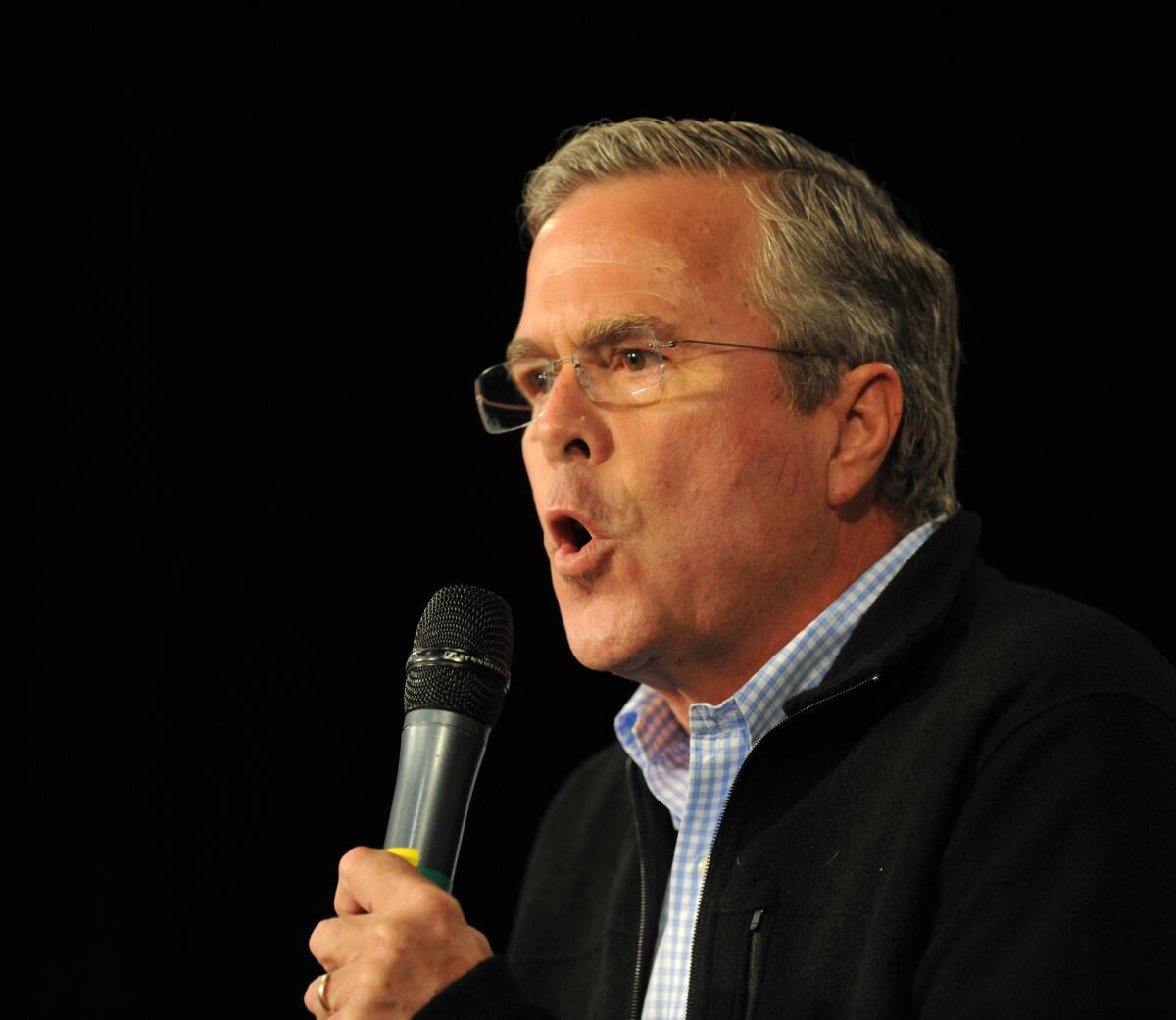
Republican presidential candidate Jeb Bush campaigns in Iowa on Saturday.
Carson raises $23 million in the fourth quarter

Republican presidential candidate Ben Carson takes questions from reporters Thursday at the Peninsula Hotel in Chicago.
Ben Carson’s campaign brought in about $23 million for the fourth quarter, his campaign announced late Wednesday, even more than rival Ted Cruz, who brought in about $20 million over the same period as he gains ground in polls going into the new year.
The announcement from campaign manager Barry Bennett was a bit of good news after Carson's recent declining poll numbers. On Tuesday, Carson said again that he'll change his staffing next week, an announcement that came after a week of publicly waffling over the decision.
"We are going to certainly be altering some things in the campaign, and we will be talking about that quite publicly next week," he told Fox Business.
Carson had previously told the Washington Post and the Associated Press that he would announce changes to his campaign in an effort to stop his fall in the polls, but he later tried to walk back what he said, accusing reporters of writing their stories "before they talked to me."
“I think the people that I have are spectacular," he told CNN at the time.
Some supporters are less convinced.
“I would like to see Ben go the distance," Carson supporter Harold Doley, a former Reagan administration official, recently told Politico. "I think that is not possible unless there’s a complete change in the hierarchy of the campaign,” Doley added.
Carson will also need to combat Cruz’s climb in the last few months — the Texas senator has gained support from evangelical Christians in Iowa, a group from which Carson had gotten backing earlier in the year.
Carson’s campaign took in about $31.4 million during the first three quarters of 2015.
Will Marco Rubio's unusual campaign strategy work?
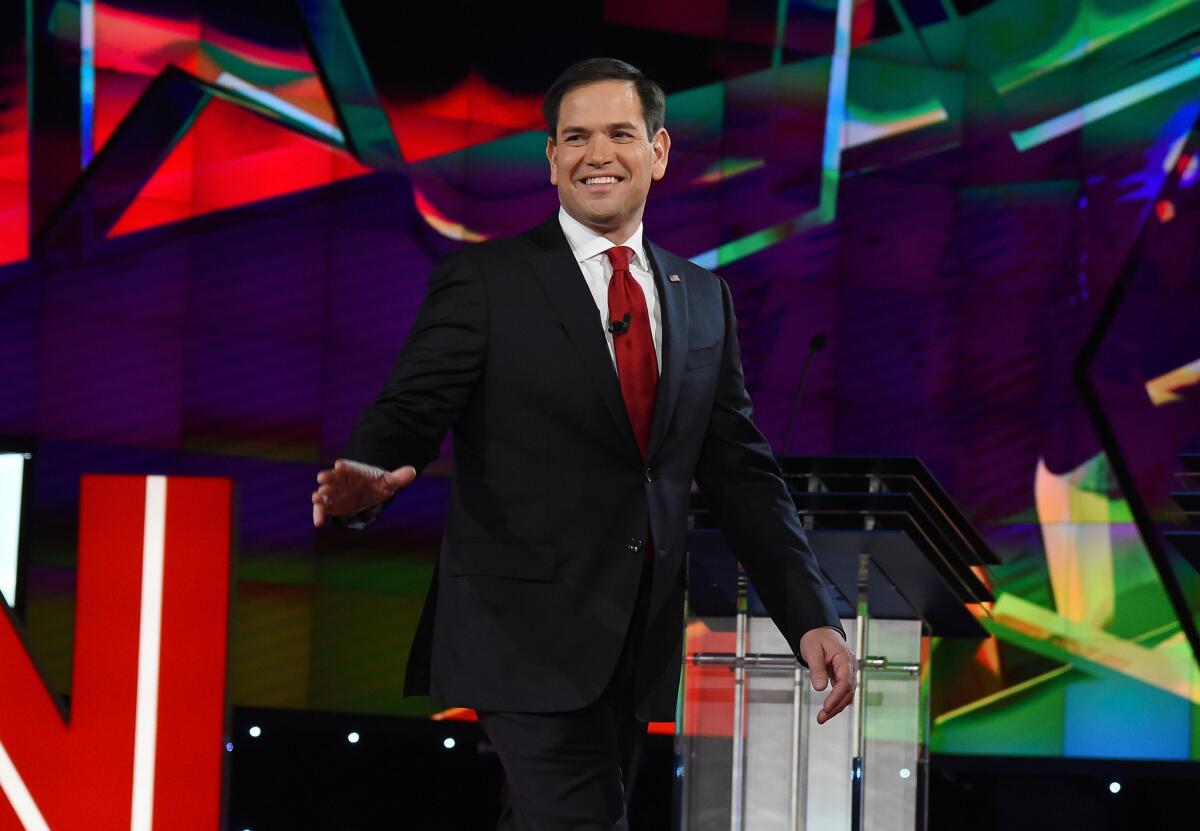
Some Republican strategists question the unorthodox campaign strategy of Florida Sen. Marco Rubio, with his preferred venues of made-for-TV rallies and cable news appearances, but his staff and supporters insist his charisma will win over voters.
Marco Rubio has missed so much time in the Senate that he's been forced to defend himself by saying he's too busy running for president to show up for votes that “don’t count” in hopelessly “broken” Washington.
But on the campaign trail, Rubio isn’t exactly a workaholic either.
Rubio's strategy is built on a preference for made-for-TV rallies and cable news appearances rather than the endless handshaking and baby-kissing that tradition suggests paves the way to the White House. His approach has GOP strategists questioning whether Rubio is willing to do the grinding work of retail politics required to win the early-nominating states.
By the numbers
Get the L.A. Times Politics newsletter
Deeply reported insights into legislation, politics and policy from Sacramento, Washington and beyond. In your inbox twice per week.
You may occasionally receive promotional content from the Los Angeles Times.






